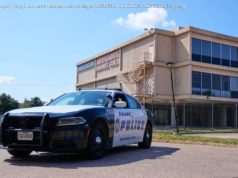WASHINGTON (AP) — The Supreme Court passed up new opportunities Monday to take on two hot topics – partisan gerrymandering and balancing LGBT and religious…
WASHINGTON (AP) — The Supreme Court passed up new opportunities Monday to take on two hot topics – partisan gerrymandering and balancing LGBT and religious rights – and also left rulings about the Trump travel ban and other big cases for coming days as it began the final week of its term.
With the conservative justices in the majority in two 5-4 decisions, the court resolved two outstanding cases — ruling in favor of Texas electoral districts that a lower court had struck down as racially discriminatory and American Express in an antitrust dispute with states over the company’s rules prohibiting merchants from steering consumers to other credit cards that charges lower fees.
The court also refused to hear an appeal from a teenager who was convicted of rape and murder, and whose story was documented in the Netflix series “Making a Murderer.”
Here’s a closer look at the what the Supreme Court did Monday:
SUPREME COURT PUNTS
Two cases presented the court with the opportunity to decide issues left open by recent rulings.
One was a North Carolina lawsuit over congressional districts drawn for partisan gain. The other dealt with religious exemptions from anti-discrimination laws for opponents of same-sex marriage. That case was about a florist in Washington state who was found to have violated the state’s anti-discrimination law when she refused to provide flowers for a same-sex wedding.
The justices took the path of least resistance and asked courts in North Carolina and Washington to review the cases in light of Supreme Court rulings in a Wisconsin districting case and a Colorado appeal from a baker who wouldn’t make a wedding cake for a gay couple. It’s not clear that either case will turn out differently and both could return to the Supreme Court quickly, perhaps in time for the term that begins in October.
___
TEXAS REDISTRICTING
A different kind of gerrymandering, using race, was at issue in the ruling upholding all but one state House district in Texas. The case was unusual because the districts at issue were adopted by a court on an interim basis as part of a discrimination lawsuit, then approved by the state legislature in what it said was an effort to end the litigation. That same court then determined that the districts were tainted by intentional discrimination or relied too heavily on race.
Justice Samuel Alito wrote for the court’s conservatives that the lower court made a mistake by not giving enough weight to the legislature’s stated intent to end the lawsuit and instead demanding that the state prove it was not discriminating against minority voters. Justice Sonia Sotomayor wrote in her dissent that challenged districts “burden the rights of minority voters.”
___
AMERICAN EXPRESS MERCHANT FEES
American Express won its case against states and the federal government over its rules that prevent merchants who accept its cards from encouraging consumers to use other credit cards that charge lower fees. The governments, and the court’s liberals, said American Express was restricting competition in violation of federal antitrust law. But Justice Clarence Thomas wrote for the five conservative justices that far from discouraging competition, American Express’ business model “has spurred robust interbrand competition and has increased the quality and quantity of credit-card transactions.”
___
MAKING A MURDERER
There was no comment from the court in rejecting an appeal from Brendan Dassey, who was 16 years old when he confessed to Wisconsin authorities that he had joined his uncle in raping and murdering photographer Teresa Halbach before burning her body in a bonfire.
Dassey’s attorneys had argued that he is borderline intellectually disabled and was manipulated by experienced police officers into accepting their story of how Halbach’s murder happened. They wanted his confession thrown out and a new trial ordered. Dassey’s attorney Lara Nirider said she’ll continue trying to win him a new trial.
___
WHAT’S LEFT
The court returns to the bench Tuesday morning to decide some, but not all, of the four remaining cases. The legal challenge to President Donald Trump’s travel ban on visitors from five mainly Muslim countries is the biggest case pending. The policy’s opponents want the court to strike it down, arguing it’s the product of bias against Muslims or exceeds the president’s authority under immigration law, an issue that has been hotly debated since Trump took office last year. But the justices allowed the ban to take full effect in December, even as the legal fight played out in the courts and several lower courts have found fault with the ban.
Two other cases involve whether government workers who don’t want to join the labor unions that represent them in collective bargaining still have to pay fees to the unions and whether states can require anti-abortion crisis pregnancy centers to provide information about abortion. The justices also are weighing a dispute over water between Florida and Georgia.






